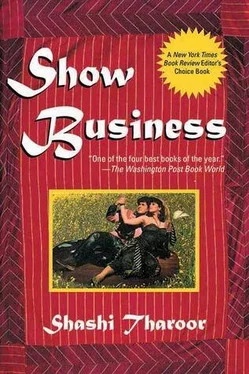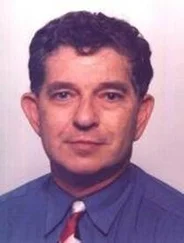The auto-rickshaw squeezes between two buses, as Ashwin comically presses himself into Ashok’s side in fear.
“Nine!”
The auto-rickshaw brakes to avoid a beggar child, spilling Ashwin in the process. As he clambers back on, Ashok throws the child all the coins in his pocket.
“Eight!”
The auto-rickshaw weaves to avoid a car and grazes a fire hydrant, which gushes forth brown water. A family of parched pavement-dwellers gratefully stretches out their hands toward the liquid.
“Seven!”
Inspector Kalia is in the act of accepting a bribe from a shady character sporting an underworld mustache, trademark stubble, and dirty white bandanna when he sees the auto-rickshaw bearing down on them. With a scream he and his accomplice move aside just in time, in opposite directions. The villain promptly flees, bribe unpaid. Kalia calls after him in vain, then pursues the auto-rickshaw.
“Six!”
The auto-rickshaw causes a car to brake sharply, sending a sheet of canvas floating from the car roof into the air. The canvas lands on a poor woman with two babies who is huddling against a wall and covers them like a blanket. The woman looks up at the auto-rickshaw in gratitude.
“Five!” Pranay’s smile has become triumphant; Mehnaz is in despair. The faces of Ashok’s supporters reveal both puzzlement and anxiety.
“Stop!” Kalia shouts from his police Jeep, drawing alongside the auto-rickshaw. Our heroes grin at him and roar on. Kalia is shaking a fist at Ashok when the three-wheeler turns sharply left, and Kalia and his Jeep, caught unawares, continue straight on, plunging into the sea with a splash. The crooked cop surfaces spluttering, seaweed replacing the habitual betel leaf in his mouth.
“Four!”
The scooter reaches the stadium. “Here, sahib?” asks the driver. “No,” says Ashok, “drive in!”
“Three!”
Ashwin hastily reties the gag on Ashok and loosely knots the ropes on the hero’s wrist. The auto-rickshaw bursts through the entrance, past a startled gate attendant, and phut-phuts down the center aisle of the stadium. The crowd turns in amazement. Mehnaz’s eyes light up in hope.
“Two!” Pranay shouts, but he is the only one still counting.
The auto-rickshaw squeals to a stop in front of the stage. Ashwin clambers out, helping a bound and gagged Ashok into view. Ashok raises his tied wrists in the air. The crowd erupts.
“One,” Pranay says feebly, looking around him wild-eyed. Ashok ascends the stage and stands before the mike. A delighted Mehnaz, beckoned by Ashwin, comes up and unties the gag. “Brothers and sisters, this is how they tried to silence me!” announces Ashok as Mehnaz waves the gag with a flourish. “But they cannot silence the voice of the people!” The crowd roars its enthusiastic approval. “This man” — Ashok points at Pranay — “thought he could humble me in your eyes by preventing my voice from being heard by all of you today. I was tied and gagged and thrown into a godown. But the people do not go down so easily.” There is good-natured laughter mixed with sounds of outrage toward Pranay. “It is this crook, this smuggler, this kidnapper, this razer of your homes, who claims to represent you today and asks for your votes. What answer will you give him?”
The crowd roars its reply with one voice, which is echoed in the pounding of angry feet swarming toward the stage. His eyes widening in panic, Pranay screams a futile plea for mercy, then turns and flees, the throng at his heels. A long shot shows him running into the distance, the cries of his pursuers fading into the dust kicked up by their feet.
The final shot: a kurta-clad Ashok, newly elected, is being garlanded in triumph. He folds his palms in a namaste, then raises them above his head in a gesture to the crowd. “The people’s court has given its verdict,” he declares. “Together, we shall march on to a new dawn.”
The camera pans to a poster of Ashok’s election symbol, the wrench, behind him, and the theme song returns to the sound track:
I’m just a good mechanic
If your car breaks down, don’t panic —
I’ll fix it?.
And the screen fills with the portentous words THIS IS NOT THE END, ONLY THE BEGINNING.
The camera lingers in close-up on Ashok’s garlanded face, the adulatory crowd, and the words on the screen before the picture fades to the strains of the national anthem and the lights come up in the cinema hall.
Monologue: Night
ASHWIN BANJARA
Maya tells me she hasn’t been able to speak a word to you so far in the hospital. She just sits here and looks at you, she says, till the thoughts well up in a surge that drowns the words. “There was so much I wanted to say to him earlier, and couldn’t,” she told me today. “What is the point of trying to find the words now?”
Of course I tell her how useful it might be to you, how it might help to bring you back to normal, and she just smiles sadly. I don’t suppose the “normal you” gave her much joy, did you? No, that’s cruel — and I don’t want to be cruel to you. Not now.
It’s strange about Maya, that you should have married someone like her. I suppose everyone at home keeps telling you that. I pictured you with someone beautiful and brittle and glamorously Westernized, like smuggled bone china. Instead she’s stainless steel, Ashok-bhai, like the thalis Ma used to serve dinner on when we were little. Always there, clean, safe, durable.
I don’t think you know how close I’ve become to her, Ashok-bhai. Closer, certainly, than I am to you. It’s not as if she tells me her secrets or anything like that. Maya wouldn’t; if she has secrets, they’d remain secret. And she has too much pride and too much loyalty to you to discuss her feelings about you with me. What she said just now was as revealing as she has ever been.
And yet what companionship there is in her silences! When I am with her I feel instantly secure, caught up in her strength, her determination, her fierce sense of what is hers to protect. I become part of her defenses, not a stranger to them. With us there is so much that need not be spoken. Especially in relation to you. We understand each other instinctively because we are both your — no, forget it.
What was I going to say — “victims”? That wouldn’t be fair. Let’s just say we both have gone through certain experiences with you, as brother, as wife, that have defined us and helped us define each other. Experiences of which you, the catalyst, are blissfully unaware. That’s the incredible thing about you, Ashok-bhai: you sail through life with such grand style, the breeze in your hair and the surface of the water all placid, without the slightest idea of the churning of the currents beneath, the torment of the smaller fish, the fate of the creatures caught up in your propellers. In fact, you wouldn’t even notice if it was seaweed you were cutting up in your swath, or sardines, or dolphins bleating for help. OK, OK, I’m getting carried away. But I have not met another human being as completely unconscious of the effect he has on people as you. It must be wonderful, that perfect self-absorption, that remarkable degree of self-contentment. I, who find myself constantly anxious about what others might think of me, envy you in this as well, as in so many things.
But, to be fair, you demand so little of people. Perhaps because you never see what you can demand of them; you have no idea of the potential of any human being, not even their potential to give. So you see people in specific little frames, playing a part in a particular situation — fulfilling your needs in bed, directing you in a film, helping you win an election — and you are completely indifferent to them outside those frames. If someone encroaches upon your life in a way that’s beyond the role you’ve subconsciously assigned him or her, you don’t know how to handle that person, any more than if an actor had walked in front of the camera and spoken someone else’s lines. Everyone has a place in your screenplay, but that place is well defined. When they have played their part, you have no use for them, at least not until their part comes up again.
Читать дальше












